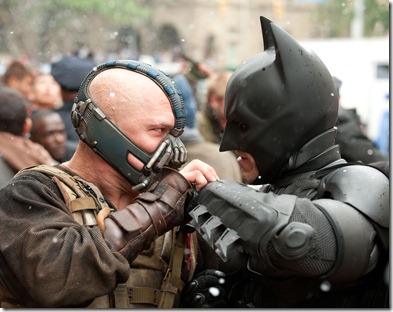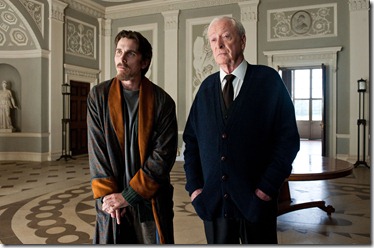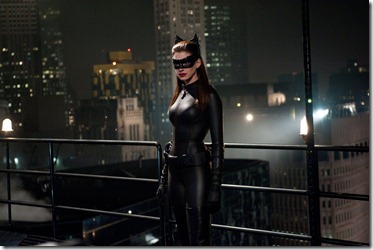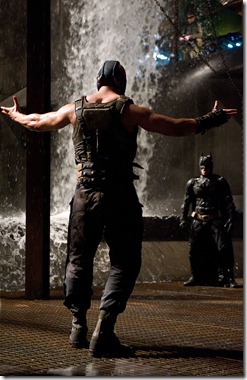Batman Begins was unprecedented. The Dark Knight was astonishing. The Dark Rises is merely… brilliant. At least, that was my first thought after seeing The Dark Knight Rises (not in IMAX, unfortunately, but that’s neither here nor there). Then I thought that maybe I felt that way because, even after seeing Batman Begins, the brilliance of The Dark Knight was completely unexpected and that, this time, I was expecting brilliance and getting it came as no surprise.
Part of the surprise of The Dark Knight was, of course, the madly genius performance of Heath Ledger as The Joker – but if all the movie had to recommend it was Ledger’s performance, it would not have been a great film. Themes like good versus evil might be a little too overstated, but there were several themes in TDK that built from that simplistic concept.
The idea of a corrupt society being saved by a heroic lie; the idea that a symbol can be inspiring and eternal; the idea that sacrifice, even in service of a flawed goal, can be noble – all these themes and more, in combination with a great script, appropriate direction and a host of great performances, made TDK a great movie. That those themes continue – along with another key theme about perseverance – throughout The Dark Knight Rises, then, should not come as any great surprise.
In the comics, back in 1993, Bane was introduced as Batman’s ultimate foe. He was smarter, tougher, stronger – and his mission wasn’t merely to beat Batman, it was too break him. He did this by wearing the Caped Crusader down and then not only beating the snot out of him, but breaking his back.
Compared to the insane nihilism of The Joker, Bane was a more mundane villain on the surface, but one of whom the saying that still waters run deep might apply. Except, of course, that Bane wasn’t actually still – he was far too angry for that. But he was also patient and shrewd and aware of his foe’s strengths and weaknesses.
In The Dark Knight Rises, Gotham City is, on the surface, a much better place than it was eight years before. Thanks to The Dent Act, organized crime has been pretty much eradicated in the city. Not much is made of the draconian, unconstitutionality of the act that has put more than a thousand of the worst examples of organized crime behind bars.
On the anniversary of Dent’s death, Commissioner James Gordon (Gary Oldman) departs from his planned speech to merely toast the results of The Dent Act. Mere days later, the inquisitive nature of young cop John Blake (Joseph Gordon-Levitt) leads to an excursion into the city sewers – and leads to that speech coming back to haunt him.
The Batman hasn’t been seen over that time because of the lie that made Dent a hero and led to the present day Gotham. When we meet Bruce Wayne (Christian Bale), he is a worn if elegant shadow of his former self – limping about with the aid of a cane and gazing about with deadened eyes. Even the best efforts of his butler, the estimable Alfred J. Pennyworth (Michael Caine), have failed to spark any semblance of a life in him.
His first faint flickerings of life come when an apparent maid brings his meal to his rooms in an otherwise unused wing of Wayne Manor and breaks into his uncrackable safe to steal a string of pearls that had belonged to his mother – and something even more valuable, and for a very different reason than personal gain.
When he encounters Selina Kyle (Anne Hathaway) again, at a charity ball – the first time he’s been seen in public in eight years – being held by Miranda Tate (Marion Cotillard), she once again gets the better of him.
Then there’s Bane (Tom Hardy). TDKR opens with a very Bondian sequence involving a Russian nuclear scientist and a mid-air kidnapping that introduces us to the character in a most spectacular fashion. It’s even more impressive when we consider that the sequence was a real stunt, filmed in mid-air, without the aid of CGI. But that’s only the beginning of Bane’s plan.
If you’ve paid attention to the beginning of this review, you really don’t need to have me tell you much more about the workings of Bane’s mind – or even of the intention of his plot, except to say that he was ex-communicated from the League of Shadows by R’as al Ghul (Liam Neeson) and his beginnings play into at least one of the themes mentioned above. Oh, and his plan has intended results that even go beyond a mere humbling of The Batman. Much further.
TDKR’s script, by Christopher and Jonathan Nolan (from a story devised by the Nolans and David s. Goyer), is not without social commentary but it would be foolish to think that scenes that resonate with the Occupy movement – and were shot while that movement was beginning – could possibly have been staged specifically to take advantage of that social phenomenon. Anyone who has even a glimmering about how movies are made knows that staging those scenes would require months of planning – and that they would require a script that had been ready for much longer than that. Still, the film’s writers definitely were attuned to current events when they broke the story for the film and that is one of the reasons that it feels so real.
One of the most surprising things about TDKR is that Bane does not, at first, seem that intimidating – even with that peculiar mask that covers half his face. Then he takes off his jacket and we see just how massively muscled he is and his filtered voice (sounding somewhat like Darth Vader if voiced by Sean Connery) takes on an even greater edge.
TDKR doesn’t shy away from current events and trends, but it bends them in serving of what used to be called a ripping yarn. Even though The Batman barely appears in the film’s first half, it zips along at a brisk pace as it ties together half a dozen plot arcs and even more character arcs. It can all be a bit dizzying – and there are more than a few places where a bit more information – or a slightly deeper look at a character – might have been nice.
The action, when it comes, it probably the best staged of any of the trilogy. The Batman may be strong, fast and tough, but he uses finesse as much as strength and, in their first two encounters, Bane is so powerful that brushes off the worst of those attacks as if they were nothing. Now we know that Bane is more than a smart guy with muscles. He knows how to use them to maximum effect.
Toss in a fusion generator that becomes weaponized; a football field that collapses (again, not a CGI effect), and the isolation of the city by blowing up all the bridges that give access to it, and you have a situation that gets more and more tense by the second – aided by Bane’s alleged turning over of the city to its 99% (of course, that’s not quite what it seems to be…).
With the aid of his regular cinematographer, Wally Pfister, Nolan has created a Gotham that looks to be in the best shape ever – until it doesn’t, and then they give it the look of a Soviet-era city: grey and worn, with people standing in long lines to get bread and other supplies.
As mentioned before, Nolan keeps things moving – even the character arcs move at a good speed – until the last forty minutes or so, when all hell breaks loose. Before that, we find Bruce in the ultimate prison, courtesy of Bane – where he experiences hallucinatory memories of R’as al Ghul and his father, asking ‘Why must we fall?’
The regular cast members – Bale, Caine, Oldman, Gordon-Levitt and Morgan Freeman as Lucius Fox – are brilliant once again. Newcomers Hathaway, Cotillard, Hardy and Matthew Modine (who plays a character who comes to need redemption) match them beat for beat. Even smaller roles spawn top flight performances from the likes Torchwood’s Burn Gorman, Juno Temple, Aidan Gillen, Rescue Me’s Daniel Sunjata, and Grimm’s Reggie Lee are spot on.
TDKR is also definitely the final film of a real trilogy. There are some terrific twists and revelations in the last few moments, but they all point to this being the final episode in this Batman’s story.
To paraphrase Roger Ebert, no good movie is ever too long and no bad movie is ever short enough. The Dark Knight Rises is 164 minutes long and it passes in an eye blink. It could have been half an hour longer and I probably wouldn’t have even noticed (please let there some deleted scenes on the DVD).
The Avengers is the best Marvel movie, but The Dark Knight Rises is the best Batman movie – or at least tied with The Dark Knight for that honor. It’s also the best film of the summer and, likely one of the best of the year. And that’s not even in its IMAX screening. Really.
Final Grade: A+
Photos courtesy Warner Bros.



